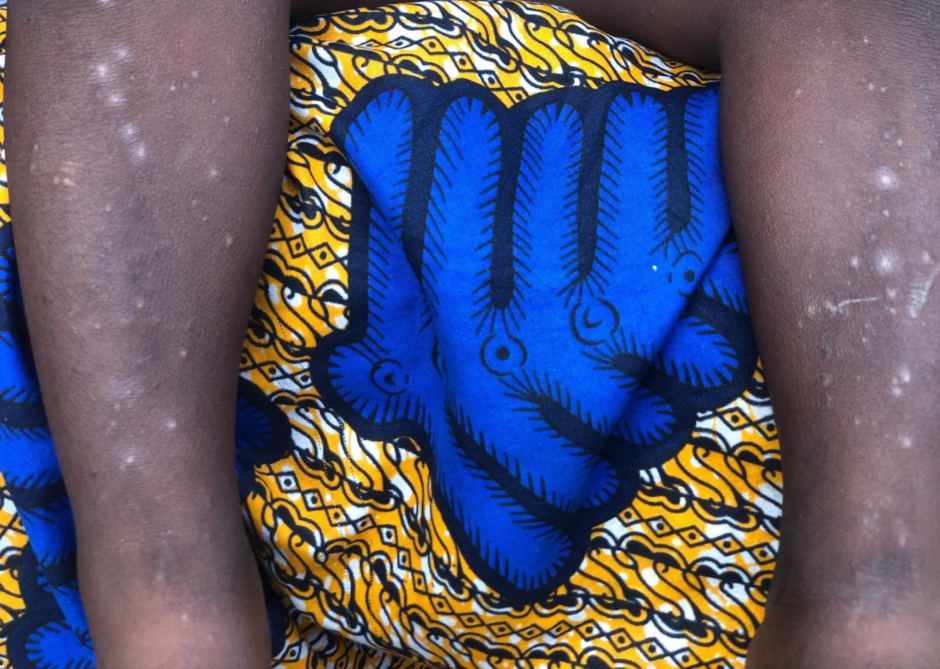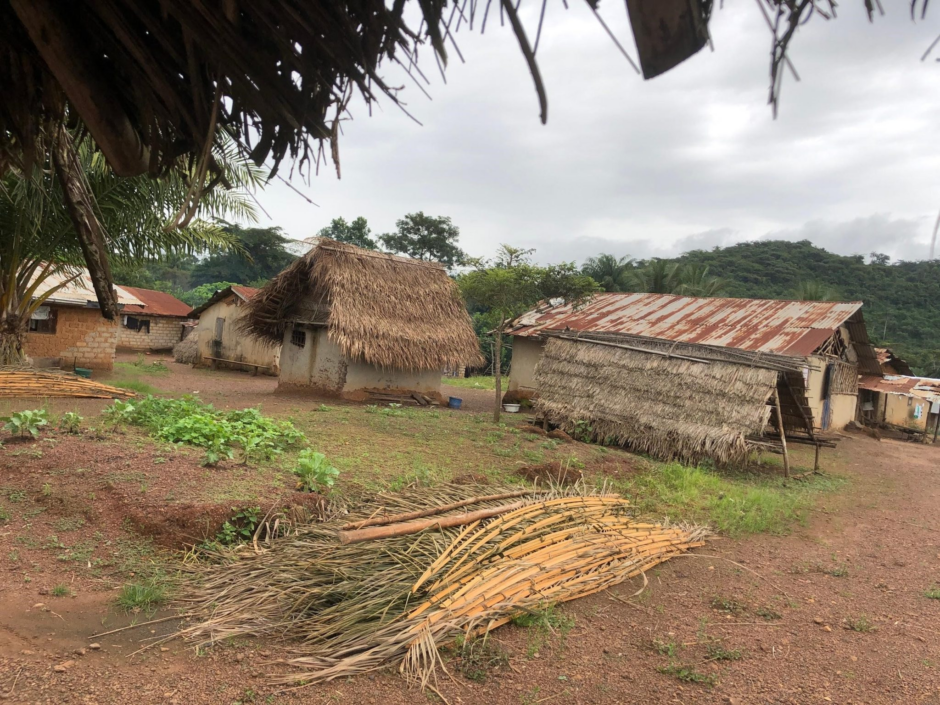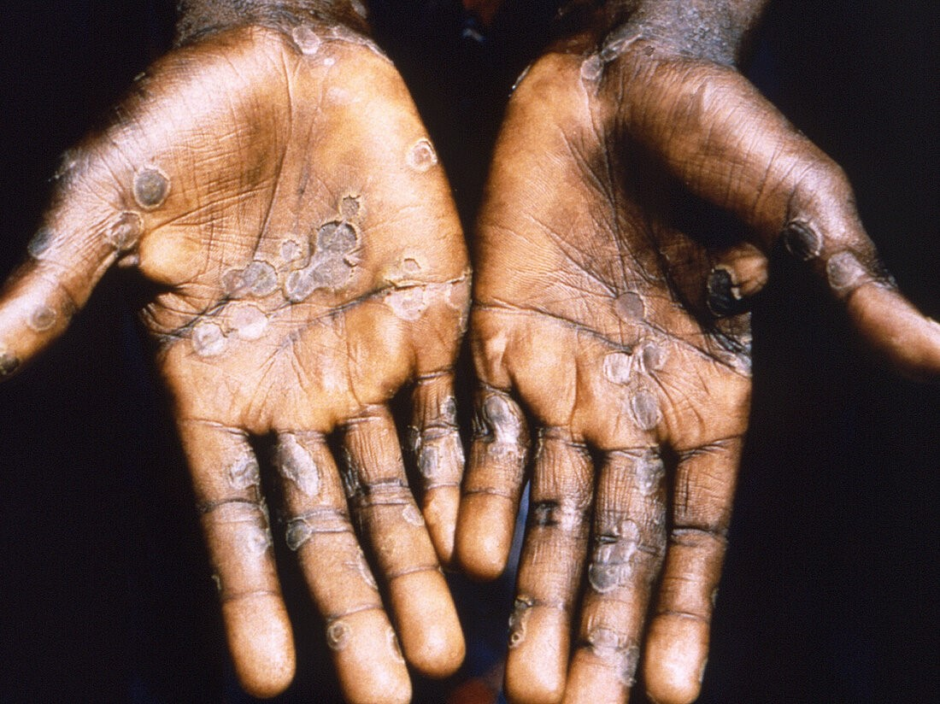
A toddler’s legs show telltale bumps of Mpox Credit: Gloria Wleh
YEALA TOWN, Lofa County – Junior cries to his mother as another stranger approaches the front of their house. The two-year-old has met too many new people since he came down with mpox in August.
None of them have had a cure for the fevers, pains and itches that have made him sick and miserable. And one of them took him and his mother away for 21 long days quarantine at the clinic here. Junior thinks this reporter is a health worker come to take him back again.
“Maa dee” he cries in his native language Lorma, telling his mother that I should “go away!”
The small bumps on Junior’s legs are still present but he is no longer contagious, says his 19-year-old mother Kebbeh. And his health is much improved. She is relieved. When he first became sick she feared the worst.
“He used to be weak and poo pooing with water. His blood was low and his skin was burning with fever,” Kebbeh said in Liberian English. “I used to feel bad and be crying. When I sit down to the hospital, it just like my son coming to die. I was not having hope that my son can survive.”
So far Junior is one of 22 who have been confirmed of cases of mpox in Liberia since the World Health Organization announced a “public health emergency of international concern” for the disease in August. Eight are active, and 14 including Junior, have recovered. Junior lives with his family of seven members, in this three-room house here in the border town with Guinea. None of the others has contracted the virus. (New Narratives/FPA is withholding the family’s names because of stigma attached to mpox.)

Yeala Town, Lofa County Credit: Gloria Wleh
Mpox, formerly called monkeypox, is an infectious disease caused by the mpox virus and can be transmitted from animals to humans and through human-to-human contact. Most people develop a fever, aches, flu-like symptoms and tell-tale bumps. Some people can be infected with the virus without having any symptoms.
Liberia is one of the more than 120 countries that have reported cases of the virus since the global outbreak began in May 2022, according to the World Health Organization (WHO). So far, 106,310 confirmed cases, including 234 confirmed deaths, have been reported globally. But another 1000 suspected deaths have been reported, almost all in the Democratic Republic of Congo (DRC).
A dramatic increase in the DRC, where nearly 50,000 suspected and confirmed cases have been reported, prompted the WHO’s August public emergency announcement. The DRC outbreak has been dominated by a new strain of the disease known as Clade 1b that is deadlier than the clade 2 strain that is endemic in West Africa. Clade 2 kills fewer than 1 percent of infected patients. Clade 1 is killing as many as one in every ten.
The National Public Health Institute of Liberia (NPHIL) announced on October 13 that testing had shown that Junior and the other patients in the country have had the less deadly strain. At the moment no mpox deaths have been announced in the country.
The news that Clade 1 had not arrived came as a relief, but medical officials have warned Liberians to remain vigilant. Sixteen countries in Africa have reported mpox cases in the last six weeks.
“Any disease can kill you. That is one thing we should keep in our minds,” said Dr. Dougbeh Nyan, Director General of the NPHIL. “So we shouldn’t rest on which one is bad, because when we do that, then most times people say this one is not bad like the other one, so we will just relax.”

A patient in the DRC with the tell-tale pox of mpox, on his hands. Credit: National Public Radio
Dr. Nyan warned people that mpox will start with a fever and then later, they will begin to see big sized bumps, like chickenpox, on their entire body. The difference between mpox and chickenpox is that chickenpox will not be on your hands, but mpox will.
“Do not be afraid. This one here, you have more chances of being cured from it. It cannot kill people quickly,” Dr. Nyan said in an interview urging people to report suspected cases to a government phone line. “When you catch the virus, it can take one to 24 days for you to start seeing symptoms. And when you start taking treatment, it may take about three months for you to be completely well. But as soon as you see this, just call 4455.”
The government said it had assigned health workers at border points throughout the country to carry out testing of people entering and leaving the country. With international partners, it has also set up a tracing system to identify patients, quarantine them and trace their contacts.
NPHIL proposed $US500,000 to $US1.5 million to the government to start the fight against mpox for the period of six months but in the 2024 recast budget the government allocated just $US380,000.
Health experts, including at NPHIL said, this amount will get things started but more will be needed for the longer fight ahead.
“It’s not adequate,” said Dr. Soka Moses, Director of the Partnership for Research on Vaccines and Infectious Diseases in Liberia (PREVAIL), a collaborative research partnership between the U.S. and Liberian governments. “You still need to set up treatment facilities, train manpower, pay them incentives and continue testing. It might do for the next one month but beyond that resources will be dried up.”
In recent weeks NPHIL has received equipment to detect which strain of the virus a patient has. That will allow the country to detect the more deadly strain quickly and take action, saving lives.
But while testing capacity has improved, health care workers in Yeala Town said they are short of even everyday protective materials like hand gloves, sanitizers and hand washing buckets. They are afraid.
“We cannot be here and we do not have enough IPC (Infection Prevention Control) materials and day in day out we are working,” said Peter Varney, officer in charge of the government run Yeala Clinic. “We are situated at the border point. So we are asking for more of those IPC materials to be present.”
Zeeman Kababeh, a vaccinator at the clinic, said he and some of his colleagues are frustrated. After surviving Ebola in 2014 and Covid in 2020, they do not want to risk their lives and that of their families anymore.
“When we receive case like that, we are afraid because we are not protected,” said Kebabeh. “We need to be protected. We are asking donors to come in quickly with protective materials.”
They may be some time coming. Dr. Moses warned that Liberia and other low-income countries are usually victims of hoarding of needed medical supplies by rich countries, which happens whenever there is a WHO declared health emergency of international concern. Nevertheless, he called on his fellow health workers across the country to continue fighting and taking whatever precautions are available to them. He reminded them they had been through far worse.
“I know it is scary but we can do this. We beat Ebola, we beat covid,” said Dr. Moses. “Mpox is a public health emergency of international concern, but it is nothing compared to what we have been through.”
While the health workers are seeking their own safety, they are also urging the public to be kind to patients of the virus.
“We should not do stigmatization and we should not blame anybody for this,” said Mr. Varney, who warned that stigmatizing patients will push people to hide their illnesses and undermine the essential effort to encourage sick people to come forward.
There is a vaccine available for mpox. Dr. Nyan said the government has put in a request to the World Health Organization and Africa Centre for Disease Control to get its doses but while numbers in the country are so low it likely be a long wait.
Only two companies in the world are producing the vaccine. Countries with a high incidence of the disease like DRC and Nigeria are being prioritized. Africa’s low capacity to produce vaccines has again been flagged as a major problem. Just one percent of all vaccines administered in Africa are produced in Africa according to the African Center for Disease Control.
This is yet another warning to African governments to prioritize vaccine creation according to Dr. Abidemi Omonisi, a pathologist lecturing at the A.M. Dogliotti College of Medicine.“What we need is government commitment to show much interest in vaccines development. We have the capacity in Africa, but we need to build it.”
A mother’s love for her child keeps Kebbeh even closer to her son while he was infected with the mpox virus. She was lucky to avoid the illness herself. The bumps on Junior have gone away but the scars are still visible. But the lad is back to playing football in the sand with his friends and looking forward to putting mpox behind him.
This story was a collaboration with FrontPage Africa as part of the “Investigating Liberia” project. Funding was provided by the Swedish embassy in Liberia. The donor had no say in the story’s content.
